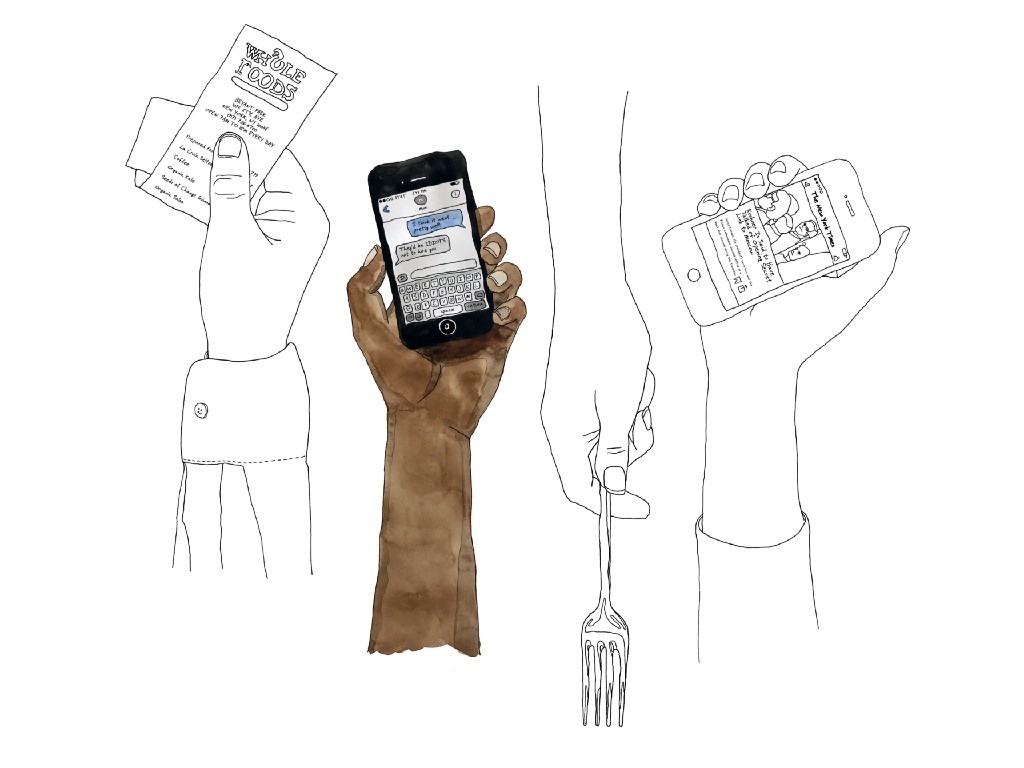Bryant Park Whole Foods

Illustration: Forsyth Harmon
Two ways to dine alone in the Bryant Park Whole Foods: The best, most coveted option is to claim one of the stools at the windows, where you can sit in a kind of blinkered solitude, side by side with others, but facing no one, your back to all the hellscape behind you, resting your eyes on canted plane trees, and the diffident marble behind of the library, and Sixth Avenue silent through the glass. Regarding all this, in your public privacy, you might feel yourself some sort of protagonist. Which is the same thing as saying that a high stool facing Sixth Avenue at the Bryant Park Whole Foods is the best place to cry in Midtown.
The problem is, the stools are popular. They tend to form an unbroken wall of elevated human backs, blocking out the light, which makes sitting at one of the jammed-in picnic tables — a lower elevation — even less desirable. (Why is it that it feels so much better to be seated higher when alone? That a perch at the bar affords a sort of aloof chic but a seat for one at an earthbound table just feels sad?) The second way to dine alone at the Bryant Park Whole Foods then, is sitting among and opposite strangers, facing one another.
When I took the seat across from you, with some tentative “May I…?” gesture, you exuded so much amiable energy in your assent, that I recanted all my life’s eye rolls at the phrase “a beautiful aura.” Because yes, yours was one of pure loveliness. In my mind, you were wearing pink, but now I think maybe you were just emanating a kind of rose quartz glow. You were young, black, with short hair and wide-awake eyes.
You complimented my pants and I told you they were new and then we had that kind of small talk between women, which, in both its smallness and in its surprised quality (here we are, two perfect strangers, having a nice chat!) and the mutual acknowledgement of both, seems uncommonly sweet. It seemed to kindle something so expansive and optimistic that it freed the phrase “small talk” from the jeer of triviality. “Small” was no longer trite, superficial, meaningless, asinine. “Small”, instead, was modest, tender, gentle and deliberate. Not “small talk” but “A small talk.” Like a small pause, or a small snack.
I had my brown cardboard box of dinner and you had yours and your general pleasure made me forget my sourness of a moment earlier: the guy at the checkout had said, “enjoy your dinner” as he handed me my receipt and, hearing a kind of snark, I’d said thanks and thought fuck you. You don’t tell someone to enjoy their dinner when she’s solo and buying a cardboard box of kale at 6 p.m. But if I were someone like you — you in your rosiness —I probably wouldn’t have felt a slight in the valediction. You were enjoying your dinner!
We were nearly all women. Women with their boxes of Prepared Foods at eight dollars a pound. A sort of sad sorority of women eating alone, together. Or maybe not sad. Maybe just a sorority. How much alone-ness to grant and how much to deny? I occupied myself with my laptop and my salad and yes, my phone too — checking nothing, urgently — but of course I couldn’t not hear you talking. You were on the phone now, and talking quietly, but of course you were right there. While I chewed quinoa and looked at my screens, I learned that you’d had a job interview and you thought it had gone pretty well and they’d all seemed nice, but smart too and, yeah you were excited about it. And as you talked, I became invested. I really wanted you to get the job. I decided, with an inappropriate degree of vehemence and allegiance, that you were definitely going to get this job and you definitely deserved this job. It was the kind of feeling that makes a woman’s best friend roar, “They’d be IDIOTS not to hire you.”
Later, when I got up to leave, I wondered whether to say something and it was the wondering, the hesitation of it, that probably made it come out wrong. “I hope you get the job!” I said, but you looked startled. You said “thanks” but I could tell that beneath it, your thanks, like mine at the checkout earlier, had the mild fuck you of resistance at a boundary breached by a stranger.
